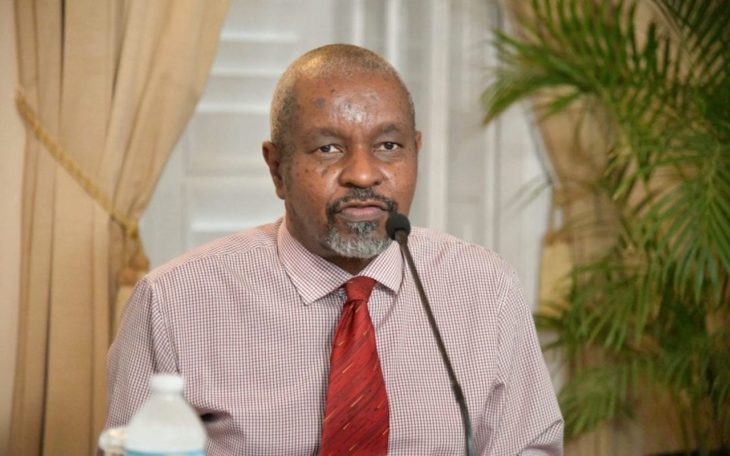Health authorities are warning Barbadians to be extra cautious during the busy Christmas season amid a double whammy of a lingering COVID-19 pandemic that has resulted in another death in recent days, and a highly infectious flu virus.
Chief Medical Officer (CMO) Dr Kenneth George said in a recorded statement on Monday that both viruses were presenting some challenges, as he noted that the true extent of COVID-19 cases may not be known since testing has declined.
He disclosed that just below 20 per cent of COVID-19 tests performed were positive while the RE – the number of people in a population who can be infected by a COVID-19-positive individual at any specific time – was above one.
“And those two metrics together indicate that we are still having COVID spread in our communities. In addition, what we also note is that the number of persons coming to be tested has fallen off and, therefore, the number of persons having COVID in our communities may not be a true reflection of what it really is,” Dr George cautioned, as he urged the most vulnerable groups to “go the extra mile” to protect their health.
“And, therefore, I ask that you be cautious around the Christmas period.”
The CMO noted that while the hospitalisation rate has remained low, and those who were hospitalised were having milder forms of illness, “we, unfortunately, within the last seven days have had a single death”.
“We continue to monitor hospitalisation and deaths as a metric to determine how severe the infections are,” the Government’s chief medical advisor said.
“We are indeed facing a double whammy because we have COVID circulating and we also have flu circulating. The flu virus has been typed – it is H3N2 that has been circulating and that has also increased steeply within the last two months. We continue to monitor both for flu and for COVID…. Fortunately…we have not had any hospitalisation or deaths associated with the flu virus,” Dr George added.
He said the Health Ministry would continue to examine the information and report to the public any changes in that trajectory.
“But it is important to note that the flu in some countries does cause significant sickness and even death. The good thing is that there are similar ways to prevent COVID as you can prevent flu,” Dr George pointed out.
“The viruses circulating are certainly not as deadly or causing severe illness as when we were in the throes of Delta. The virus circulating is very infectious, so the likelihood of transmission is high but the outcomes appear to be a bit better.”
The CMO assured the public that the Ministry had not taken its eye off COVID-19.
“We don’t come to the public as often as before, but we continue to run the EOC [Emergency Operations Centre], [and] have several systems in place in the background to make sure that the national response continues,” he assured.
However, Deputy Chief Environmental Health Officer and former head of the now defunct COVID-19 Monitoring Unit, Ronald Chapman promised Barbadians that the Government would not go back to the tight restrictions that were imposed at the height of the pandemic.
“The Ministry of Health has no intention at this present time to return to the heavy-handed approach that we had during COVID. You can see that with the relaxation of the protocols and also with the dissolution of the COVID-19 Monitoring Unit. So, we are at a place where we believe that persons can act responsibly, that persons can take stock of their own risks, they can look and see how they can protect themselves as opposed to having persons police every movement that they make,” he said.
“That was important during the period of time because we knew very little about the disease and we had a lot of hospitalisations and we were dealing with highly infectious strains at that point in time. Now we have a better handle on it and it is time that we get a return to some sense of normalcy.”
He encouraged Barbadians to protect themselves from both COVID-19 and the flu.
“As international travel ramps around this time of the year, it is extremely important that we pay attention to our preventive measures which are mask-wearing, which is still probably the best if not the best method of preventing the spread of respiratory illness; continue to ensure your hand hygiene is up to scratch, and if you are not able to wash your hands still use your hand sanitisers,” Chapman stressed.










